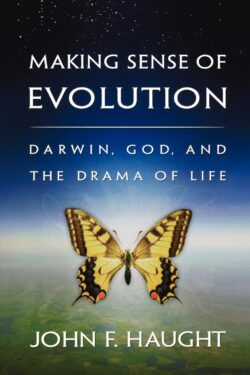First in a series
I cannot recall ever starting to write one of these weekly columns with the insecurity and lack of confidence that I am experiencing as I begin to write this one. There is an idea that I want to communicate and I don’t know if I can communicate it clearly. It is an idea I have received from contemporary science and I think I have never been more aware of my poor background in science. Anything that I write in this column about evolution that is true will be due to my reading of several of the books written by John Haught; anything I write in this column about evolution that is erroneous is not due to John Haught’s brilliance but to my ignorance.

I first read John Haught in 1986. At St. John’s University I had agreed to teach a course entitled “The Problem of God.” As I prepared the course I decided to divide it into three sections: the first section on traditional arguments for the existence of God, such as the arguments offered by St. Anselm and St. Thomas Aquinas; the second on the philosophies of influential atheists such as Feuerbach, Nietzsche, Freud, and Sartre; the third on some contemporary ways of thinking about God. I found a collection of essays about God that I could use in teaching the first two sections of the course but I had difficulty choosing what text I might use in the third section.
Looking back at how I discovered the third book, I believe my choice was providential. I saw an ad in America for the book, which had recently been published. The book was John Haught’s “What Is God? How To Think About The Divine” (New York: Paulist Press, 1986, pp. 142). There are some books that I have read that literally have changed my life. “What Is God?” is one of those books. Reading and reflecting on it changed my view of God, my view of priesthood, my view of preaching and sacraments, and my view of people who describe themselves as nonbelievers. Since 1986 I have read many other books by Haught, most dealing with theology and science.
Scientists claim that the universe began about 13 billion years ago. Haught claims that if we study evolution we will discover a narrative, a story, a drama. In his book “Making Sense of Evolution: Darwin, God and the Drama of Life” (Louisville, Kentucky: Westminster John Knox Press, 2010, pp. 163) Haught writes the following:
“Recently astrophysics and cosmology have found in the pre living period of cosmic theory an essential prelude to the story of life. Science has discovered, for example, that the forging of the atomic and molecular constituents of life in massive stars billions of years ago is an integral part of the story. Far from being merely stage preparation and rehearsal, the epochs of physical processes that occurred in the vast span of cosmic history before the actual appearance of life almost four billion years ago may be thought of as an overture to the opera. From the very start, the universe’s physical constants and cosmic condition had to be exactly suitable for life to exist and be the dramatic story that it is.” (55-56)
Haught is saying that even before human consciousness appeared evolution was a narrative, a story. I think of this as a preface to the appearance of the human species.
Arguing that evolution is a story, Haught writes the following about story:
“To hold your attention, it has to have (1) an openness to novelty and surprise, (2) a continuity or coherence that ties the stream of events together, and (3) a passage of time sufficient for the drama to unfold. A series of occurrences add up to a drama only if it fuses unpredictability with some degree of predictability and a period ample enough for the relevant events to happen. This triplet of components is also the medium in which religions, myths, and theologies seek to make the world intelligible. All three elements — contingency, continuity, and time —are essential to any story, and they cannot be isolated from one another without splintering the narrative into disconnected droplets.”(p.57)
Haught argues very persuasively that thinking of evolution as a story will enrich our view of both science and story, of both the human person and God.
Father Lauder is a philosophy professor at St. John’s University, Jamaica. He presents two 15-minute talks from his lecture series on the Catholic Novel, every Tuesday at 9 p.m. on NET-TV.
